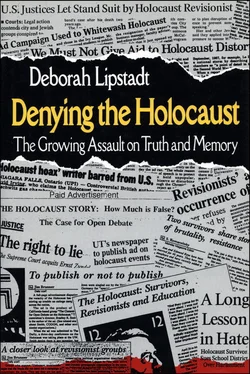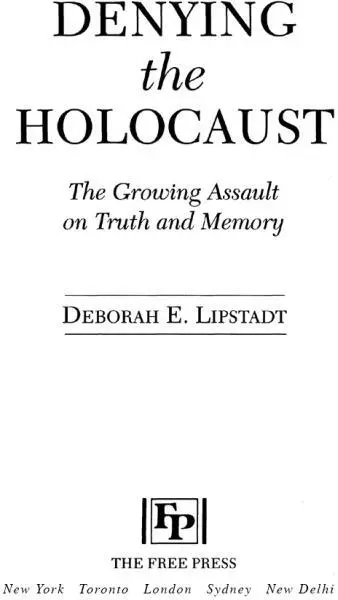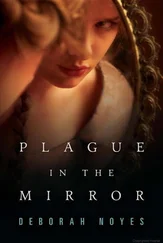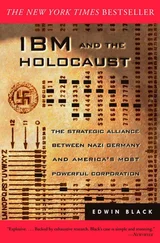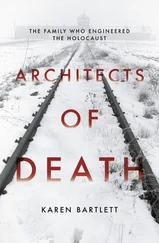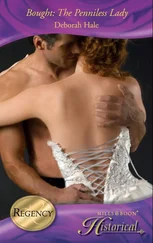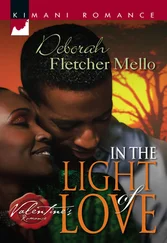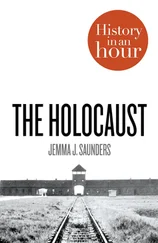Deborah E. Lipstadt
DENYING THE HOLOCAUST
The Growing Assault on Truth and Memory
To the victims and the survivors of the Holocaust and to those who preserve and tell their story
“Remember the days of yore,
Learn the lessons of the generation that came before you.”
—Deuteronomy 32:7
When I first began studying Holocaust denial, people would stare at me strangely. Incredulous, they would ask, “You take those guys seriously?” Invariably I would be challenged with the query, “Why are you wasting your time on those kooks?” My intention to write a book on this topic would have evoked no stronger a reaction if I were to write about flat-earth theorists.
That situation has changed dramatically. Regrettably, I no longer have to convince others of the relevance of this work. In fact, those who once questioned my choice of a topic now ask when the book will be available. The deniers’ recent activity has fostered enhanced interest that gives my work unanticipated relevance. But rather than be delighted at no longer having to convince people that this is a legitimate topic, I wish we could still afford the luxury of wondering whether we should take these people seriously. Given the terrible harm they can cause, I would have much preferred to pursue something obscure than an issue that is now so relevant.
This has been a difficult project because at times I have felt compelled to prove something I knew to be true. I had constantly to avoid being inadvertently sucked into a debate that is no debate and an argument that is no argument. It has been a disconcerting and, at times, painful task that would have been impossible without the aid and support of a variety of people. Without them I would have never emerged from this morass. A number of friends and colleagues carefully read and commented on portions of this manuscript. Their observations and criticisms enhanced my work immeasurably. My profound thanks to Arnold Band, Yisrael Gutman, Manuel Prutschi, Michael Nutkiewicz, Regina Morantz-Sanchez, David Ellenson, Michael Berenbaum, David Blumenthal, and Grace Grossman. In addition, I received important assistance from Gail Gans and the research department of the Anti-Defamation League. Adaire Klein, chief librarian of the Simon Wiesenthal Center, graciously made the Center’s resources available to me, as did Elizabeth Koenig of the United States Holocaust Memorial Museum. Tony Lehrman of the Institute for Jewish Affairs in London generously helped with research. Manuel Prutschi of the Canadian Jewish Congress provided me with important background information on the activities of Ernst Zundel. Michael Maroko and Jeff Mausner shared important aspects of the Mel Mermelstein case with me. Shelly Z. Shapiro was particularly generous with her time and energy.
I would like to thank Yehuda Bauer, the chairman of the Vidal Sassoon Center for the Study of Antisemitism, The Hebrew University of Jerusalem, who was a patient and valuable colleague throughout.
Elliot Dorff, Peter Hayes, Elinor Langer, Laurie Levenson, Doug Mirell, Larry Powell, Claudia Koonz, Jason Berry, Alex Heard, Terry Pristin, Paul Kessler, Joyce Appelby, Riki Heilik, Rutty Gross, Mark Saperstein, Glenda B. Minkin, and Sherry Woocher all gave their time and insights. Kenneth Stein of the American Jewish Committee provided important data on the deniers’ recent activities.
At The Free Press, Erwin Glikes recognized the importance of this work from the outset. At a time when others were looking at me strangely and wondering why I was bothering with this project, he urged me to move forward with it. Adam Bellow was a precise and demanding editor, exactly what I needed and wanted. His support of this project and his sensitivity to the broader dangers of Holocaust denial were crucial in helping me reach this stage. Susan Llewellyn copy edited with careful attention. Edith Lewis helped ensure speedy production of the final manuscript.
I complete this book as one chapter of my life has closed and a new one is opening. Finishing the book would have been impossible if not for the support of a close circle of friends. They were like family: loving, dependable—particularly at times of crisis—and supportive of me even when it was difficult to be so. Though I am now physically distant from most of them, they remain quite near, having taught me that God’s presence can be found in many different places and made manifest in a variety of ways (Genesis 28:16).
Deborah E. Lipstadt Atlanta, Georgia January 14, 1993
CHAPTER ONE
Canaries in the Mine
Holocaust Denial and the Limited Power of Reason
We are not afraid to follow truth wherever it may lead, nor to tolerate any error so long as reason is left free to combat it.
—Thomas Jefferson
{1} 1 Dumas Malone, The Sage of Monticello: Jefferson and His Time, vol. 6 (Boston, 1981), pp. 417–18.
You are mistaken if you believe that anything at all can be achieved by reason. In years past I thought so myself and kept protesting against the monstrous infamy that is antisemitism. But it is useless, completely useless.
—Theodor Mommsen
{2} 2 Marvin Perry, “Denying the Holocaust: History as Myth and Delusion,” Encore American and Worldwide News, Sept. 1981, pp. 28–33.
The producer was incredulous. She found it hard to believe that I was turning down an opportunity to appear on her nationally televised show: “But you are writing a book on this topic. It will be great publicity.” I explained repeatedly that I would not participate in a debate with a Holocaust denier. The existence of the Holocaust was not a matter of debate. I would analyze and illustrate who they were and what they tried to do, but I would not appear with them. (To do so would give them a legitimacy and a stature they in no way deserve. It would elevate their antisemitic ideology—which is what Holocaust denial is—to the level of responsible historiography—which it is not.) Unwilling to accept my no as final, she vigorously condemned Holocaust denial and all it represented. Then, in one last attempt to get me to change my mind, she asked me a question: “I certainly don’t agree with them, but don’t you think our viewers should hear the other side?”
I soon discovered that this was not to be an isolated incident. Indeed, in the months before I completed this manuscript, I had one form or another of this conversation too many times. A plethora of television and radio shows have discovered Holocaust denial. Recently the producer of a nationally syndicated television talk show was astounded when I turned down the opportunity to appear because it would entail “discussing” the issue with two deniers. She was even more taken aback when she learned that hers was not the first invitation I had rejected. Ironically—or perhaps frighteningly—she had turned to me because she read my work while taking a course on the Holocaust. When the show aired, in April 1992 deniers were given the bulk of the time to speak their piece. Then Holocaust survivors were brought on to try to “refute” their comments. Before the commercial break the host, Montel Williams, urged viewers to stay tuned so that they could learn whether the Holocaust is a “myth or is it truth.”
My refusal to appear on such shows with deniers is inevitably met by producers with some variation on the following challenge: Shouldn’t we hear their ideas, opinions, or point of view ? Their willingness to ascribe to the deniers and their myths the legitimacy of a point of view is of as great, if not greater, concern than are the activities of the deniers themselves. What is wrong, I am repeatedly asked, with people hearing a “different perspective”? Unable to make the distinction between genuine historiography and the deniers’ purely ideological exercise, those who see the issue in this light are important assets in the deniers’ attempts to spread their claims. This is precisely the deniers’ goal: They aim to confuse the matter by making it appear as if they are engaged in a genuine scholarly effort when, of course, they are not.
Читать дальше
